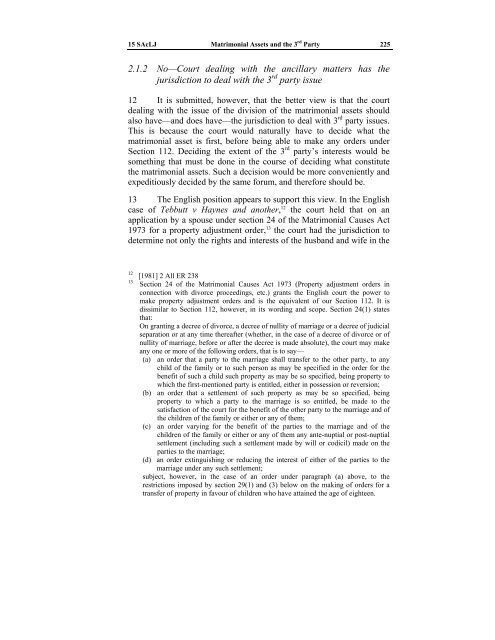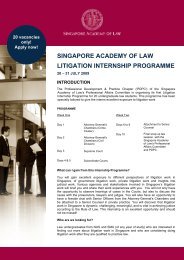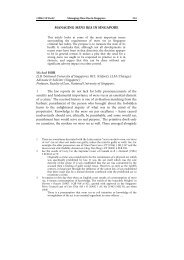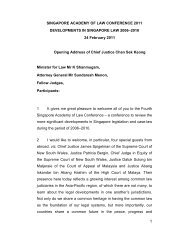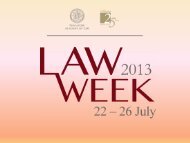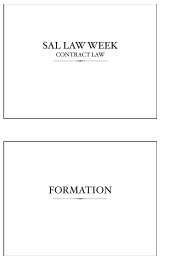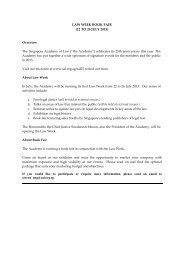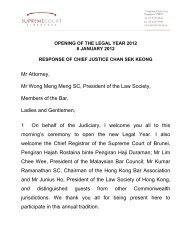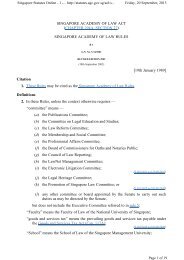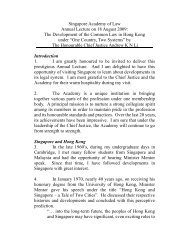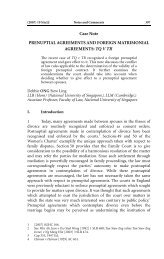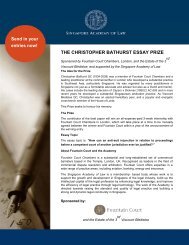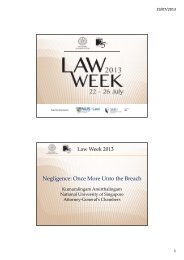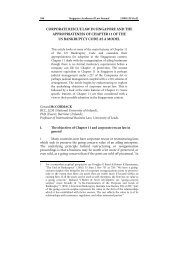View Article - Singapore Academy of Law
View Article - Singapore Academy of Law
View Article - Singapore Academy of Law
You also want an ePaper? Increase the reach of your titles
YUMPU automatically turns print PDFs into web optimized ePapers that Google loves.
15 SAcLJ Matrimonial Assets and the 3 rd Party 225<br />
2.1.2 No—Court dealing with the ancillary matters has the<br />
jurisdiction to deal with the 3 rd party issue<br />
12 It is submitted, however, that the better view is that the court<br />
dealing with the issue <strong>of</strong> the division <strong>of</strong> the matrimonial assets should<br />
also have—and does have—the jurisdiction to deal with 3 rd party issues.<br />
This is because the court would naturally have to decide what the<br />
matrimonial asset is first, before being able to make any orders under<br />
Section 112. Deciding the extent <strong>of</strong> the 3 rd party’s interests would be<br />
something that must be done in the course <strong>of</strong> deciding what constitute<br />
the matrimonial assets. Such a decision would be more conveniently and<br />
expeditiously decided by the same forum, and therefore should be.<br />
13 The English position appears to support this view. In the English<br />
case <strong>of</strong> Tebbutt v Haynes and another, 12 the court held that on an<br />
application by a spouse under section 24 <strong>of</strong> the Matrimonial Causes Act<br />
1973 for a property adjustment order, 13 the court had the jurisdiction to<br />
determine not only the rights and interests <strong>of</strong> the husband and wife in the<br />
12<br />
13<br />
[1981] 2 All ER 238<br />
Section 24 <strong>of</strong> the Matrimonial Causes Act 1973 (Property adjustment orders in<br />
connection with divorce proceedings, etc.) grants the English court the power to<br />
make property adjustment orders and is the equivalent <strong>of</strong> our Section 112. It is<br />
dissimilar to Section 112, however, in its wording and scope. Section 24(1) states<br />
that:<br />
On granting a decree <strong>of</strong> divorce, a decree <strong>of</strong> nullity <strong>of</strong> marriage or a decree <strong>of</strong> judicial<br />
separation or at any time thereafter (whether, in the case <strong>of</strong> a decree <strong>of</strong> divorce or <strong>of</strong><br />
nullity <strong>of</strong> marriage, before or after the decree is made absolute), the court may make<br />
any one or more <strong>of</strong> the following orders, that is to say—<br />
(a) an order that a party to the marriage shall transfer to the other party, to any<br />
child <strong>of</strong> the family or to such person as may be specified in the order for the<br />
benefit <strong>of</strong> such a child such property as may be so specified, being property to<br />
which the first-mentioned party is entitled, either in possession or reversion;<br />
(b) an order that a settlement <strong>of</strong> such property as may be so specified, being<br />
property to which a party to the marriage is so entitled, be made to the<br />
satisfaction <strong>of</strong> the court for the benefit <strong>of</strong> the other party to the marriage and <strong>of</strong><br />
the children <strong>of</strong> the family or either or any <strong>of</strong> them;<br />
(c) an order varying for the benefit <strong>of</strong> the parties to the marriage and <strong>of</strong> the<br />
children <strong>of</strong> the family or either or any <strong>of</strong> them any ante-nuptial or post-nuptial<br />
settlement (including such a settlement made by will or codicil) made on the<br />
parties to the marriage;<br />
(d) an order extinguishing or reducing the interest <strong>of</strong> either <strong>of</strong> the parties to the<br />
marriage under any such settlement;<br />
subject, however, in the case <strong>of</strong> an order under paragraph (a) above, to the<br />
restrictions imposed by section 29(1) and (3) below on the making <strong>of</strong> orders for a<br />
transfer <strong>of</strong> property in favour <strong>of</strong> children who have attained the age <strong>of</strong> eighteen.


